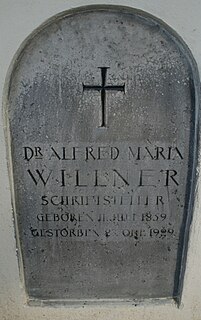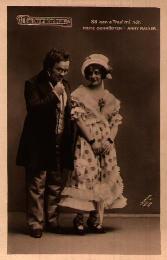See also
- Das Dreimäderlhaus (disambiguation)
- Blossom Time at Ronnie Scott's, a 1966 live album by Blossom Dearie
Blossom Time may refer to:
Virginia is a state in the United States of America. Prior to American independence from Great Britain it was known as the Colony of Virginia.
Lilac Time may refer to:

John Charles Thomas was an American opera, operetta and concert baritone.
Tommy may refer to:

The Raimund Theater is a theatre in the Mariahilf district of Vienna, Austria.

Alfred Maria Willner was an Austrian writer, philosopher, musicologist, composer and librettist.
Supergirl is a DC Comics superhero character.

Das Dreimäderlhaus, adapted into English-language versions as Blossom Time and Lilac Time, is a Viennese pastiche operetta with music by Franz Schubert, rearranged by Heinrich Berté (1857–1924), and a libretto by Alfred Maria Willner and Heinz Reichert. The work gives a fictionalized account of Schubert's romantic life, and the story was adapted from the 1912 novel Schwammerl by Rudolf Hans Bartsch (1873–1952). Originally the score was mostly Berté, with just one piece of Schubert's, but the producers required Berté to discard his score and create a pasticcio of Schubert music.
Dream Girl or dreamgirl may refer to:
Apple Blossom may refer to:
Gretl Schörg was an Austrian operatic soprano and actress. She was particularly known for her performances in operettas. Her signature roles included Dodo in Wedding Night in Paradise, Josepha Vogelhuber in The White Horse Inn, Juliette in Der Graf von Luxemburg, Julischka in Maske in Blau, Laura in Der Bettelstudent, and Pepi in Wiener Blut. She made several operetta recordings for Telefunken, Columbia Records, and Polydor Records. She was also active as a dramatic actress on the stage and in films. In April 2004 she was awarded the Austrian Cross of Honour for Science and Art, 1st class.

Heinrich Berté, born Heinrich Bettelheim was an Austria-Hungarian composer of operas and operettas.

Blossom Time is a 1934 British musical drama film directed by Paul L. Stein and starring Richard Tauber, Jane Baxter and Carl Esmond. It was based on the opera Blossom Time by Heinrich Berté. In nineteenth century Vienna, composer Franz Schubert assists a girl with whom he is secretly in love. The film had a London midnight premiere on 10 July 1934, a trade/press showing in Nottingham on 25 July, and opened to the public on 24 August at the Regal Cinema, Marble Arch, where it ran for seven weeks. The Vienna premiere was at the 'Apollo' on 20 November 1934.
Das Dreimäderlhaus is a Viennese operetta based on the 1912 Rudolf Hans Bartsch novel Schwammerl.
Chanson d'amour may refer to:
Else Rambausek was an Austrian actress and singer.
The House of Three Girls is a 1918 German silent film directed by Richard Oswald and starring Julius Spielmann, Wilhelm Diegelmann and Sybille Binder. It is based on the operetta Das Dreimäderlhaus. It is a lost film.

The House of Three Girls is a 1958 Austrian-West German musical film directed by Ernst Marischka and starring Karlheinz Böhm, Rudolf Schock and Magda Schneider. It is based on the operetta Das Dreimäderlhaus. The story had previously been made into the film Three Girls for Schubert in 1936.
The House of Three Girls may refer to:
Princess Charming may refer to: